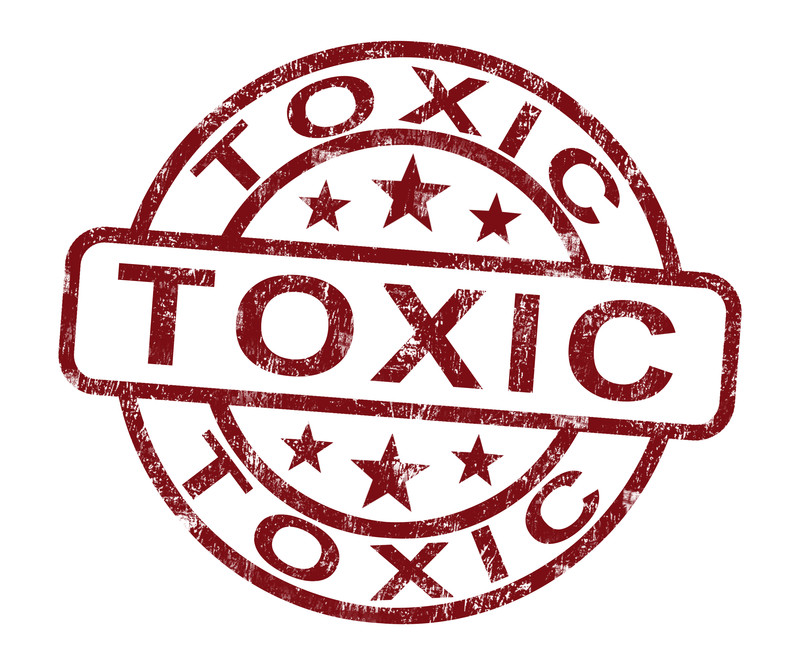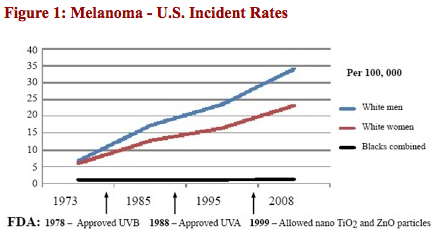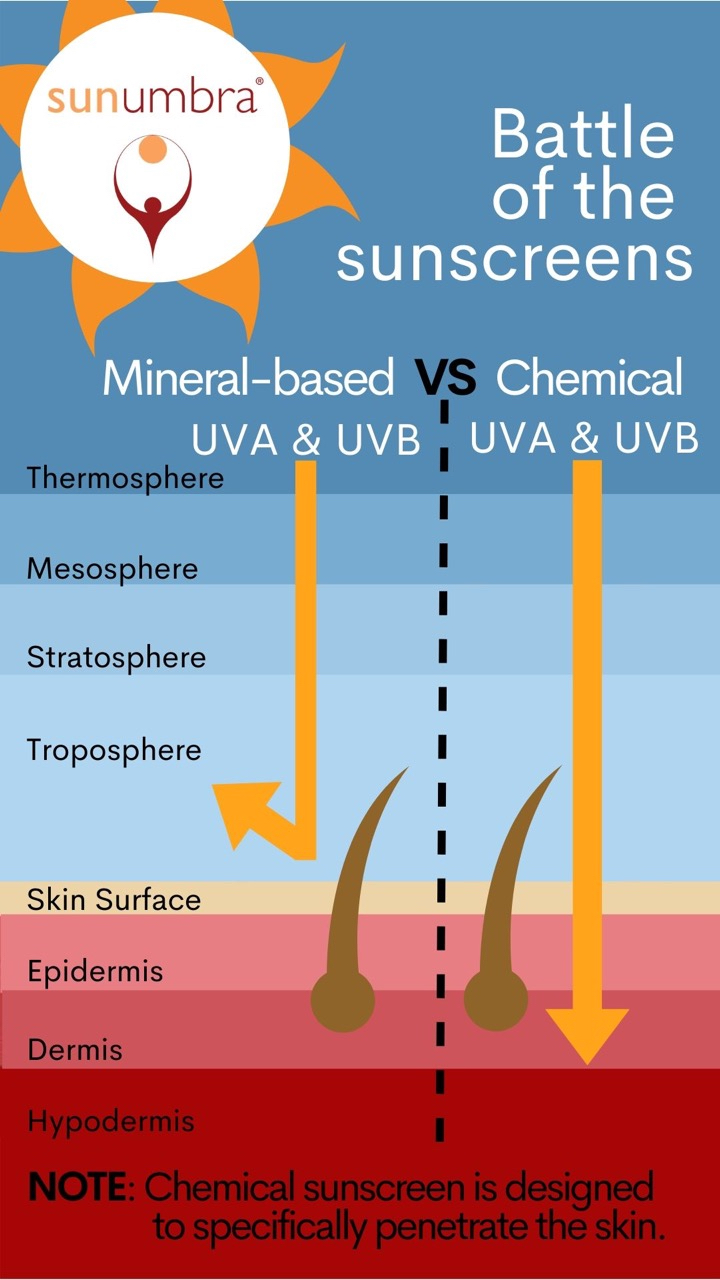Organic sunscreen
How to choose a healthy brand
How to look for an organic sunscreen that is:
- free of unhealthy and potentially dangerous chemical filters AND
- free of ANY toxic ingredients PLUS
- blocks both UVA and UVB rays effectively?
Related topics
Biodegradable sunscreen
Natural sunblock
Organic sunblock
Natural sunscreen
Gisele Bundchen
Sunscreen allergy
Dog sunscreen
Chemical free sunscreen
Sunscreen botanicals
Antioxidant supplements
What are antioxidants?
Nontoxic skin care
Embrace the outdoors healthily
 Embracing the sunshine on a clear blue sky day
Embracing the sunshine on a clear blue sky dayIf you're like me and love to get outdoors and embrace the sunshine whenever possible, plus you are aware that protecting our skin is also of huge importance to our health, then looking for a healthy organic sunscreen is vital.
A sunscreen doesn't need to contain any unhealthy synthetic or toxic chemical sun filters, yet unfortunately many do. Invariably, choosing an inorganic pure mineral sunscreen to protect your skin instead, like zinc oxide, is a far healthier option.
Beyond that, if the sunscreen is bolstered with organic natural ingredients that nurture the skin at the same time as protecting it, you will have chosen the best possible organic sunscreen option.
Choose Zinc Oxide
There is just no need to damage your skin with chemicals to avoid getting sunburnt. Rather choose zinc oxide based protection instead in an organic sunscreen product. As a mineral sunscreen, it is 100% natural, provides high level protection for both UVA and UVB, plus has excellent healing qualities.
Reasons to avoid these chemical sunscreens:
- Octinoxate (Octyl Methoxycinnamate): gender bending (estrogenic)
- Oxybenzone (Benzophenone-3): allergic reactions and hormone disrupting
- Avobenzone (Butyl Methoxydibenzoylmethane): becomes toxic in sunlight!
- Octocrylene: potentially carcinogenic in itself
- Homosalate: Hormone disruptor; forms toxic metabolites
- Padimate O (Octyl Dimethyl Paba / Paba Ester): releases free radicals; damages DNA; estrogenic and allergic reactions
- Ensulizole (Phenylbenzimidazole Sulfonic Acid: potentially carcinogenic in itself
- Mexoryl SX: Degrades 40% in sunlight, produces reactive oxygen species
- Octyl Salicylate: Skin penetration enhancer; allows other chemicals into blood.
- Benzophenone (Sulisobenzone): irritates skin & eyes. Skin penetration enhancer.
Avoid ALL toxic cosmetic ingredients

A healthy lifestyle is vital to combat the toxins encountered in our everyday living. Choosing cosmetics with healthy ingredients and avoiding these toxic cosmetic ingredients is part of that lifestyle:
- Sodium Laurel, Lauryl Sulfate, or Sodium Laurel Sulfate: Combined with other chemicals this becomes Nitrosamine, a powerful carcinogen, which penetrates the skin’s moisture barrier, allowing chemicals in
- PEG (Polyethylene Glycol), Polysorbates, or Ethoxyylate alcohol: all contain dioxane, which is carcinogenic and probably one of the most potent toxins known to man
- Propylene Glycol: can cause dermatitis, kidney or liver abnormalities, skin growth prevention, or just plain irritation
- Phenol Carbolic Acid: Can cause circulatory collapse, paralysis, convulsions, coma, and even death from respiratory failure
- Acrylamide: Can cause breast cancer
- Toluene (Benzoic; Benzyl or Butylated
Hydroxtoluene): can cause anemia, low blood cell count, liver and kidney
damage and birth defects
Natural and organic preservatives do not damage your health.
Commonly used Parabens are endocrine disruptors mimicking oestrogen, upsetting hormone balance, plus are carcinogenic.
Choosing your best organic sunscreen means avoiding all the above!
 Mother applying sunscreen to her child on the beach
Mother applying sunscreen to her child on the beach3 types of UV filters in sunscreens are:
- Organic chemical compounds that absorb ultraviolet light eg. oxybenzone
- Inorganic particles that reflect, scatter, and absorb UV light eg. titanium dioxide or zinc oxide
- Organic particles that mostly absorb light in a similar way to the organic chemical compounds, but they contain multiple chromophores that reflect and scatter a fraction of light like the inorganic particles. Their behavior is therefore different in formulations to the above 2. eg. Bisoctrizole
As seen, the chemical compound filters are referred to as 'organic' but are not actually considered the healthiest option. So, how does one define in simplistic as possible terms, what is healthy and what is not? But more especially so where sunscreens are concerned, what is the difference between an 'organic sunscreen' and a 'natural' one?
Chemical, Natural, Organic

Synthetic chemicals
There are many ingredients used in cosmetic or pharmaceutical products today that are created in laboratories but do not occur anywhere in nature. As such they are not considered 'natural' and equally so are not 'organic'.
100% Natural
Then we have mineral substances that are found naturally in nature, but are inorganic, such as Zinc Oxide.
Organic
Generally, organic substances are known to be plant materials that are grown without any chemicals, herbicides, pesticides or any artificial substance.
We humans are actually an organic substance ourselves, and we work best when we process or break down substances that are either organic or natural and we don't cope with the artificially made substances very well at all.
So we find ourselves in today's wonderfully polluted environment with all the synthetic chemicals and 'artificial substances' in our every day living, which has resulted in our bodies struggling to cope.
Organic sunscreen labels
While out there looking for a healthy sunscreen option, you will find many manufacturers of an organic sunscreen not articulating, or substantiating, why. Quite often it is because they contain some organic ingredients, typically essential oils or plant extracts. However, although wonderful in themselves, these organic ingredients often collectively account for a very small percentage of the whole product.
A few examples of what some product labels contain are:
- "enriched with certified organic herbs and pure plant proteins for optimum benefits"
- "the nurturing compositions contain certified organic, biodynamically grown and wild-crafted plants and pure essential oils to fortify the skin."
Although this is not necessarily an untrue label, in that there are organic ingredients being used in the product, it can often be a little misleading as to just how organic the whole product actually is.
Further to this, products labeled 'natural' can be misleading for much the same reasons. In either case, 'organic' or 'natural' labels' legislation is evolving rapidly, and certification organizations are increasing. Legislation has been around for some time already for individual ingredients, but not as much so for the whole product.
Thus, even if found in health shops or such, there is no guarantee that the product is wholly organic or natural. Indeed, they could even contain chemicals known to be carcinogenic or harmful to the environment.
Some of the more widely known ingredients to avoid if you would like to have as wholesome and healthy an organic sunscreen as possible, are:
- Avobenzone (Parsol 1789)
- Oxybenzone and benzophenone-3
- Methoxycinnamate based eg Octyl Methoxycinnamate (Octinoxate); Cinoxate;
- Parabens (synthetic preservatives have been linked to cancer)
- Petrochemicals (see wikipedia)
- PABA (4-Aminobenzoic acid)
- Octocrylene
- Mineral oils (choose vegetable carrier oils rather)
Toxic chemicals also increase the production of free radicals leading to deterioration and slowing down of the cell renewal process.
Environmental concerns
 Father and son happily embracing the sunshine
Father and son happily embracing the sunshineOrganic Sunscreen and the Environment
How many times have you gone off on holiday and arrived at your sunny destination and tried to find sunscreen without the potential to damage the environment?
Some of the chemicals contained in sunscreens are shown to damage our environment when they wash off. eg. swimmers or sailors in seas, lakes, or dams; or surfers and divers in the sea. An increasing number of research projects revealing links between dying coral reefs and toxins contained within sunscreens have fuelled this concern. These toxins include chemical sunscreens such as avobenzone, but also preservatives such as Parabens.
One such research project published in 2008, indicated that non organic sunscreens can have a rapid effect on hard corals and cause bleaching by damaging the symbiotic zooxanthellae. Their results also suggested that sunscreens containing parabens, cinnamates, benzophenones, and camphor derivatives, can contribute to this hard-coral bleaching if released into natural systems.
They estimated between 16,000 and 25,000 tons of sunscreens would be used in tropical countries annually. According to their experiment, it was estimated that at least 25% of the amount of sunscreen applied is then washed off while swimming, accounting for a potential release of 4,000 - 6,000 tons/year in the reef areas.
Taking these estimates further, they state their belief that up to 10% of the world's coral reefs would be threatened by sunscreen-induced coral bleaching. Because human use of tropical ecosystems and coral reef areas is progressively increasing, they predicted that the impact of non organic sunscreens on coral bleaching will grow considerably in the future on a global scale.
Ultimately they were encouraging further the utilization of UV filters that do not threaten the survival of these endangered tropical ecosystems.
Natural organic sunscreens are usually significantly more biodegradable. Many tour operators, holiday resorts, cruise lines, nature resorts, dive resorts, outdoor adventure operators and marine reserves actually go so far as to insist that holiday makers wear natural, biodegradable, organic sunscreen. However, once again, even though labeled as 'biodegradable', try to remember to make sure that the ingredients listed above are not contained within the biodegradable product's ingredients list.
Learning from the History of Sunscreen usage

Despite decades of sunscreen use globally, melanoma and other skin cancers are on the rise.
Recent medical research has indicated that this is due more to the increased use of traditional sunscreens, with all their toxic chemicals, than to the depletion of the ozone layer.
Birth defects, lower sperm counts, and a plethora of other medical problems are also now being linked to some of these chemical ingredients still found in many sunscreens today, as well as other cosmetics.
In addition to this, many sunscreens are unable to effectively block UVA rays, or only block the UVB rays. Both UVA and UVB need to be efficiently addressed for a sunscreen to be effective.
So, beyond your sunscreen not containing potentially harmful chemicals and providing an effective block for both UVA and UVB, choosing an organic sunscreen that contains healthy, genuinely organic ingredients will further enhance the quality of your choice.
Why choose Organic sunscreen?

Where Food is concerned:
Chemicals pollute the food we eat, the air we breathe, and the water we drink. If you are inclined to eat processed foods made with artificial ingredients, their nutritional value has been stripped. Without any organic focus, many of the fruits and vegetables we eat will contain pesticides and herbicides. Additionally, the meat we eat will most likely contain hormones and antibiotics.
Where Cosmetics are concerned:
Varying mixtures of synthetically produced chemicals are contained in our cosmetics today. The skin is the largest organ in our bodies and individual ingredients in the cosmetics will vary in their ability to penetrate it. Some will be absorbed in tiny amounts, while some reach the blood vessels and are transported around the body. Although any one product may contain very small amounts of some of these synthetic ingredients, it is the cumulative effect of applying various products regularly that is causing concern.
Natural ingredients on the other hand are actually supportive to the skin. They are bioactive, which means that they work with your skin, in the same way your natural oils do because the chemicals found in plants are very similar to the chemicals found in your body.
The skin can therefore recognize and work with the natural ingredients and make use of them in its constant effort to rebuild, regenerate and rejuvenate itself. This is in great contrast to many synthetic skincare ingredients, which have no direct use for the cells of our bodies and rather work in opposition to them.
Allergies:
Some cosmetic ingredients have been linked in the media with various health scares and these have led some people to choose organic as a safer alternative. Commonly, people suffering from sensitive skin or skin conditions like eczema or psoriasis, feed back reports where organic skin care products used are shown to work far better. This is predominantly because they contain either no synthetic chemicals at all, or very small amounts.
For babies and growing children:
Parents tend to be more discerning in their choice of natural and organic, as developing bodies with young, tender skin are far more susceptible to chemicals and more likely to develop allergic reactions.
When you start to add all these things up, your health can pay a high price.
There are those that choose organic cosmetic products simply to continue with a lifestyle choice to eat organic food, and want to continue to support the positive benefits to the environment that their organic choices make.
However, choosing an organic sunscreen that is not only free of chemicals or artificially produced substances, but one that provides your body with increased healing capabilities, can only benefit you!
So, take time to assess what you choose and make it as organic and natural as possible.





New! Comments
Have your say... please leave me a comment in the box below.